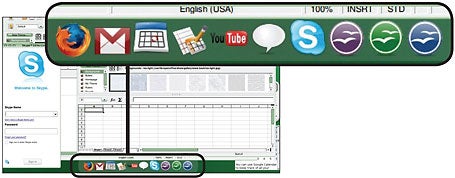The Future of Your PC's Software
64-Bit Computing Allows for More RAM
In 1986, Intel presented its initial 32-bit CPU. It wasn't until 1993 that the main completely 32-bit Windows OS- - Windows NT 3.1- - took after, formally finishing the 16-bit period. Presently 64-bit processors have turned into the standard in desktops and scratch pad, however Microsoft still won't focus on an each of the 64-bit Windows. Be that as it may, it can't live in the 32-bit world until the end of time.
What is it? 64-bit adaptations of Windows have been around since Windows XP, and 64-bit CPUs have been with us significantly more. Indeed, for all intents and purposes each PC sold today has a 64-bit processor in the engine. Sooner or later Microsoft should cast off 32-bit out and out, as it did with 16-bit when it propelled Windows NT, in the event that it needs to instigate buyers (and outsider equipment and programming engineers) to redesign. That isn't likely with Windows 7: The up and coming OS is now being demoed in 32-bit and 64-bit renditions. In any case, impediments in 32-bit's tending to structure will in the end pressure everyone into taking a potentially rash action; it's as of now an issue for 32-bit Vista clients, who have discovered that the OS won't get to more than around 3GB of RAM since it basically doesn't have the bits to get to extra memory.
At the point when is it coming? Hope to see the move toward 64-bit quicken with Windows 7; Microsoft will probably change over to 64-bit only with Windows 8. That'll be 2013 at the most punctual. In the mean time, Mac OS X Leopard is now 64-bit, and some equipment producers are presently endeavoring to progress clients to 64-bit variants of Windows (Samsung says it will push its whole PC line to 64-bit in mid 2009). What's more, shouldn't something be said about 128-piece processing, which would speak to the following huge hop? We should handle one ocean change at once - and plan for that move around 2025.
Regardless of whether you adore Vista or detest it, the present Windows will soon go to that incredible advanced memorial park in the sky. After the lukewarm gathering Vista got, Microsoft is putting a surge on Vista's development, referred to presently as Windows 7.
What is it? Now Windows 7 is by all accounts the OS that Microsoft needed to discharge as Vista, yet did not have the time or assets to finish. Other than proceeding with refinements to the security arrangement of the OS and to its look and feel, Windows 7 may at last convey to fulfillment the since a long time ago reputed database-like WinFS document framework. Execution and similarity upgrades over Vista are likewise anticipated.
In any case, the primary purpose of Windows 7 is probably going to be upgraded online incorporation and more distributed computing highlights - search for Microsoft to tie its developing Windows Live administrations into the OS more emphatically than any other time in recent memory. Prior to his retirement as Microsoft's administrator, Bill Gates recommended that a supposed inescapable desktop would be a concentration of Windows 7, giving clients an approach to take every one of their information, desktop settings, bookmarks, and so forth starting with one PC then onto the next - apparently as long as each one of those PCs were running Windows 7.
At the point when is it coming? Microsoft has set a deadline of January 2010 for the arrival of Windows 7, and the official date hasn't slipped yet. Be that as it may, gossip has the principal official beta turning out before the finish of this current year.
In case you haven't noticed, Google now has its well-funded mitts on just about every aspect of computing. From Web browsers to cell phones, soon you'll be able to spend all day in the Googleverse and never have to leave. Will Google make the jump to building its own PC operating system next?
What is it? It's beginning and end, or so it appears. Google Checkout gives a contrasting option to PayPal. Road View is well on its approach to taking a photo of each house on each road in the United States. Also, the fun is recently beginning: Google's initial beta Chrome program earned a 1 percent piece of the overall industry in the initial 24 hours of its reality. Android, Google's wireless working framework, is hitting handsets as you read this, turning into the main sound challenger to the iPhone among refined clients.
At the point when is it coming? Despite the fact that Google appears to have secured everything, numerous spectators trust that intelligently it will next endeavor to assault one major piece of the product showcase: the working framework.
The Chrome program is the main toe Google has plunged into these waters. While a program is the manner by which clients associate with the greater part of Google's items, making the hidden working framework fairly superfluous, Chrome in any case needs an OS to work.
To make Microsoft superfluous, however, Google would need to work its way through a minefield of gadget drivers, and still, at the end of the day the outcome wouldn't be a decent answer for individuals who have specific application needs, especially most business clients. However, a straightforward Google OS- - maybe one that is essentially a redone Linux conveyance - joined with shoddy equipment could be something that progressions the PC scene in ways that littler players who have toyed with open-source OSs so far haven't been very ready to do.
Inquire in 2011, and investigate the not-associated with-Google gOS, thinkgos meanwhile.












No comments:
Post a Comment